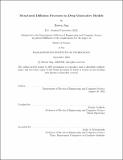Structured Diffusion Processes in Deep Generative Models
Author(s)
Jing, Bowen
DownloadThesis PDF (5.524Mb)
Advisor
Jaakkola, Tommi
Terms of use
Metadata
Show full item recordAbstract
Diffusion generative models have emerged as a powerful, versatile, and elegant generative modeling framework for diverse data modalities. However, the high computational cost of inference relative to other frameworks remains a chief limitation of such models. At the same time, the design space of a key component in their formulation—the forward diffusion process—has been underexplored. This thesis proposes a paradigm to accelerate and improve diffusion generative models by tailoring structured forward diffusion processes to the generative modeling problem at hand.
Case studies of structured diffusion processes are developed and presented for (1) natural images and (2) molecular conformers. First, the subspace structure in images is exploited to develop subspace diffusion, a forward diffusion process that restricts the diffusion via projections to subspaces of decreasing dimensionality. Second, chemical constraints in molecular conformers are exploited to develop torsional diffusion, a forward process that preserves those constraints by operating over a lower-dimensional, non-Euclidean space. Both approaches simultaneously improve sample quality and reduce inference runtime while preserving existing capabilities—and developing new ones—of diffusion generative models.
Date issued
2022-09Department
Massachusetts Institute of Technology. Department of Electrical Engineering and Computer SciencePublisher
Massachusetts Institute of Technology